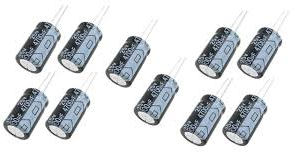Capacitors for the Future: Trends in Capacitor Technology and the Role of Indian Suppliers

Strong 8k brings an ultra-HD IPTV experience to your living room and your pocket.
In 2024, capacitor technology is undergoing a rapid transformation, shaped by demands for higher efficiency, faster data transfer, and smaller form factors. As industries in India and worldwide embrace electric vehicles, 5G infrastructure, renewable energy, and Internet of Things (IoT) applications, capacitors remain a foundational component, vital in everything from consumer electronics to renewable energy systems. In this thriving field, Indian capacitor suppliers are stepping up, with manufacturers like Glomore among the leaders, meeting domestic and international needs with a focus on advanced technology, customization, and sustainability.
Trends Driving Change in Capacitor Technology
1. Miniaturization and High-Efficiency Needs
A core trend is the demand for smaller, more efficient capacitors that provide high capacitance without taking up significant space. The global capacitor market, expected to grow at a CAGR of 4.6% by 2028, sees miniaturization as essential. In India, where smartphone sales are projected to reach around 1 billion units by 2025, small, high-capacitance components are crucial. New technologies like multi-layer ceramic capacitors (MLCCs) provide high performance in a compact package, supporting India’s growing demand for smart devices and IoT-based applications.
2. Advanced Capacitors for Energy Storage
Capacitors, especially supercapacitors, play a critical role in energy storage solutions, which are essential for renewable energy grids and electric vehicles (EVs). India, being the third-largest renewable energy producer globally, has ambitious targets to reach 500 GW of renewable capacity by 2030. Capacitors support these efforts by storing and supplying quick bursts of energy to balance power grids. This capability is vital for EVs as well, as supercapacitors improve battery life and offer quick charging, contributing to India’s push for electric mobility.
Glomore, a capacitor supplier in India, has actively engaged in manufacturing supercapacitors designed to handle high power density, offering reliable, rapid charge-discharge capabilities essential for EV infrastructure.
3. Temperature-Resistant and Durable Materials
Capacitors face harsh conditions, especially in automotive and industrial applications. Innovations in dielectric materials have led to capacitors that perform efficiently in extreme temperatures and high-stress environments. For instance, polymer-based capacitors offer enhanced heat resistance, aligning well with India’s diverse climate zones—from Rajasthan’s scorching summers to Himachal Pradesh’s chilly winters. These capacitors contribute to reducing equipment downtime, a significant advantage for Indian industries dependent on reliable performance, from telecom to manufacturing.
4. Environment-Friendly Capacitors
Sustainability is central to today’s capacitor technology. With India aiming for net-zero emissions by 2070, eco-friendly capacitors that reduce environmental impact are highly valued. Manufacturers are prioritizing capacitors free from toxic elements like lead and mercury, aligning with India’s e-waste management rules and sustainability goals. This shift also supports Indian businesses as they export to markets like Europe, where strict environmental regulations are in place.
The Role of Indian Capacitor Suppliers
A Growing Domestic Manufacturing Base
Indian capacitor suppliers are making significant strides in catering to the domestic market, traditionally dependent on imports from countries like China and Japan. Local suppliers have benefited from initiatives like the “Make in India” and Production Linked Incentive (PLI) schemes. These policies incentivize electronics manufacturing and help suppliers reduce dependency on imports while meeting rising demands. Suppliers like Glomore exemplify the growth in domestic capacity, developing capacitors for various industries, from consumer electronics to electric mobility.
Customization and Adaptation
Indian industries frequently require tailored capacitor solutions, especially in sectors like renewable energy and industrial automation. Unlike one-size-fits-all imported components, Indian suppliers have adapted to this need by offering customization services. This flexibility ensures that businesses receive products that precisely meet their needs, improving efficiency and reducing waste. Suppliers can also rapidly modify production processes to adapt to changes, such as a rise in demand for specific capacitor types for green energy solutions in states like Tamil Nadu and Gujarat, which lead in renewable energy initiatives.
Commitment to Quality Standards
To compete internationally, Indian capacitor manufacturers adhere to global quality standards like ISO 9001, helping their products gain acceptance in global markets. Maintaining these standards also boosts domestic demand as companies become increasingly quality-conscious. Suppliers like Glomore have invested in research and development, ensuring that their products meet rigorous standards, essential in sectors like aerospace and defense, where reliability is non-negotiable.
Emerging Markets and Opportunities
Electric Vehicles (EVs) and Automotive Industry
India’s EV market, expected to grow at a CAGR of 49% between 2023 and 2030, is a major consumer of capacitors. With the government’s push for EV adoption, the demand for high-performance capacitors that can handle rapid charging and extreme temperatures has surged. Capacitor suppliers in India are innovating with advanced materials and technology to provide EV-ready solutions, positioning themselves as key players in this sector.
5G and Telecommunications
As India rolls out 5G, capacitors are in demand for telecommunications infrastructure, where they ensure stable power supply and smooth data transfer. Suppliers are working to develop capacitors that can withstand high frequencies and deliver consistent performance, supporting India’s vision of becoming a global hub for 5G infrastructure.
Solar Energy and Smart Grids
The Indian government’s emphasis on renewable energy has created opportunities in solar power and smart grid development. Capacitors stabilize voltage and manage power in solar inverters, while in smart grids, they improve efficiency by balancing power flows. With around 20 GW of solar capacity added in 2023 alone, India’s capacitor demand in this sector continues to grow. Indian manufacturers who produce durable, high-capacity capacitors play a key role in supporting the nation’s renewable energy goals.
Why Indian Capacitor Suppliers Are Poised for Success
Indian capacitor suppliers have shown resilience and adaptability, leveraging local resources and aligning with market needs. With a strong focus on innovation and quality, they cater to domestic demands and are increasingly competitive in international markets. Suppliers like Glomore are setting benchmarks, focusing on quality, sustainability, and technological advancement to meet evolving industry needs.
As India’s reliance on advanced technology grows, local capacitor suppliers will be instrumental in building a sustainable, self-reliant economy. The expertise and dedication of Indian manufacturers reflect in every capacitor they produce, contributing significantly to industries that shape the future of the country.
Note: IndiBlogHub features both user-submitted and editorial content. We do not verify third-party contributions. Read our Disclaimer and Privacy Policyfor details.







